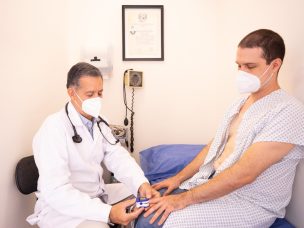Melanoma
Is Melanoma Treatment In Sight?
Melanoma: A Challenge Melanoma, a highly malignant type of skin cancer, is a significant health concern globally, with a median survival of 6 to 10 months. Researchers are actively investigating the cell signaling mechanisms that can affect tumour growth. Recently, the Institute of Cancer Research, London, reported on a significant scientific discovery. Researchers grew cells...
Effective Treatments for Melanoma Brain Metastases
Melanoma brain metastasis (MBM) is found in 30–40% of patients with advanced melanoma. While treatment options are accessible, MBM remains a challenge to treat effectively. Around 30-40% of patients with advanced melanoma present with melanoma brain metastases (MBM) at diagnosis, with a higher percentage of patients exhibiting MBM at the time of death in autopsy....
The Impact of Comorbidities on Melanoma
Patients with multiple comorbidities in addition to melanoma may be less likely to receive appropriate treatment than patients without comorbidities. Clinicians and health systems are encouraged to address these inequalities in melanoma treatment. Disparities in the treatment of patients with melanoma exist in the United States and can have a negative impact on patient outcomes....
Does Age Matter for Advanced Melanoma Treatments?
Age-related disparities exist in patients with advanced melanoma regarding overall survival. One study addressed the limited data on the use of immune checkpoint inhibitors (ICIs) in different age groups and their effect on survival rates. Immune checkpoint inhibitors (ICIs) changed the landscape of melanoma treatment, improving the overall survival (OS) of affected patients. Studies have...
Dealing With Disparities in Melanoma Screening
Detecting melanoma early in patients is crucial for ensuring positive outcomes. A cross-sectional audit study explains the importance of increasing healthcare access and educating primary care physicians on diagnostic techniques. Melanoma is one of the most common cancers with a generally good prognosis if caught early. However, the late detection of melanoma could lead to...
Overcoming Disparities in Melanoma Recognition
Patients with skin of color (SOC) face disproportionately high rates of morbidity and mortality from melanoma. Increasing the awareness of disparities in melanoma recognition and improving diagnostic strategies are key to improving the outcomes of melanoma. Melanoma is a relatively common skin cancer that affects all groups of people in the United States. However, the...
Making Meaningful Change in Dermatology Research
In this MD Newsline exclusive interview with dermatologist Dr. Edidiong Kaminska, we discuss the latest research on melanoma treatment. We also discuss how to improve diversity and inclusion in dermatology clinical trials. MD Newsline: Is there any research that excites you or that you think is important for physicians to know related to the diagnosis and...
Dr. Edidiong Kaminska's Melanoma Treatment Strategy
In this MD Newsline exclusive interview with dermatologist Dr. Edidiong Kaminska, we discuss Dr. Kaminska’s melanoma treatment strategy. MD Newsline: How do you manage melanoma? Dr. Edidiong Kaminska: “Melanoma management depends on the stage of the melanoma. Usually, at the dermatological level, after a biopsy when the diagnosis is confirmed, if it is a stage...
Dr. Edidiong Kaminska: Melanoma Disparities
In this MD Newsline exclusive interview with dermatologist Dr. Edidiong Kaminska, we discuss disparities in diagnosing and treating melanoma before and during the COVID-19 pandemic. MD Newsline: What disparities in diagnosing and treating melanoma have you observed in your clinical practice? Dr. Edidiong Kaminska: “Primary care providers are the first line when it comes to...
More Medical News












